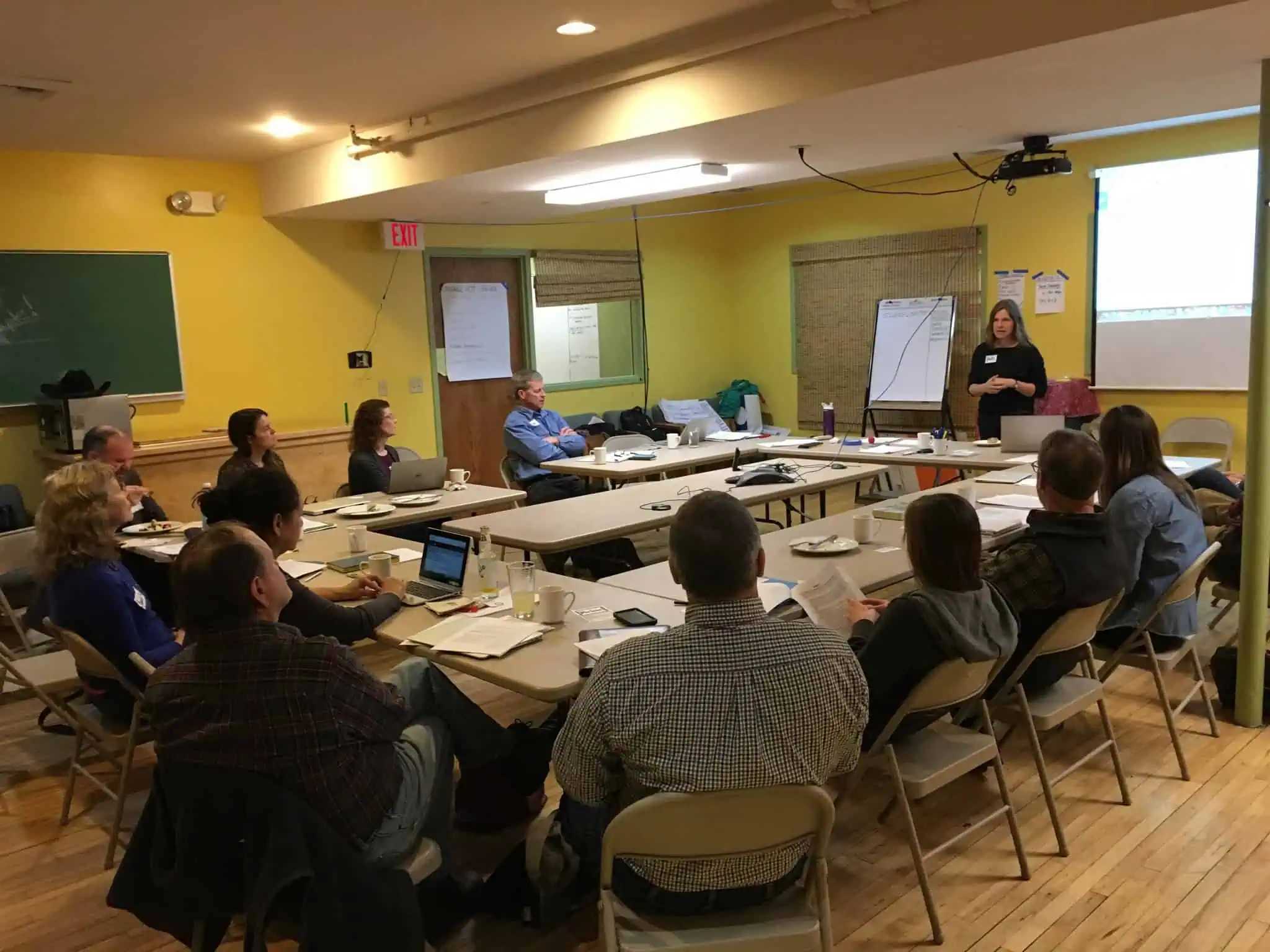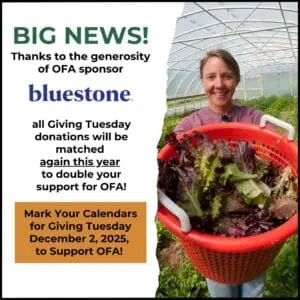Organic Farmers Travel to Washington D.C.
Organic Farmers Travel to Washington D.C. to Advocate for Policy Changes
Farm Bill, USDA programs, and organic enforcement are key priorities
Washington, D.C., February 17, 2026—Organic farmers from across the country will attend the Organic Farmers Association’s (OFA) 9th annual Farmer Fly-In, March 2-5, 2026. Alongside organizational members and OFA staff, farmers will meet with legislators, House and Senate Agriculture Committee staff, and representatives from the Department of Health and Human Services and the USDA to advocate for supportive policies on key issues in the organic farming sector.
Farmers will highlight the urgent need for a new farm bill that supports the interests of organic producers. This includes ensuring that farmers who have invested in the transition to organic certification can obtain the same USDA services and programs that conventional producers rely on, and that U.S. farmers can access the U.S. organic market share without interference from import fraud, corporate control, or consolidation. This is the right time for these conversations as the organic marketplace is growing; dollar sales for organic reached $71.6 billion in 2024, according to the 2025 Organic Market Report.
“Organic farmers are the best spokespeople to educate our legislators on what farmers need to continue to provide healthy food to our communities. Farmers are under a lot of strain, and it’s imperative that Congress works across the aisle to complete a farm bill to update the policies organic farmers need to thrive,” said Executive Director Kate Mendenhall.
The current farm bill has been extended three times, and although many farm bill programs were funded through the 2025 reconciliation package, key policy updates remain necessary.
Other key policy areas being advocated for include:
- Improving organic integrity
- Funding increased organic research
- Making USDA programs like credit and crop insurance work for organic farmers
- Expanding the Organic Certification Cost Share Program
- Providing assistance for organic dairy farmers
- Increasing organic infrastructure and domestic organic supply chains
- Preventing organic import fraud
OFA members will address these priorities during the Farmer Fly-In by building relationships with their legislators to craft policies that will ensure a better future for our country’s food system. They will emphasize the importance of investing in our domestic organic farmers to support national food security, rural development, and put American farmers first in the U.S. market. This year, 27 farmers and four members of organic organizations representing farmers from 19 states will attend.
For more information about the farm bill policies OFA and organic farmers are advocating for, visit organicfarmersassociation.org/policy.
OFA organic farmer members can be made available for interviews by contacting OFA Communications Manager Madison Letizia.
###
About Organic Farmers Association
The Organic Farmers Association (OFA) provides a strong and unified national voice for domestic certified organic producers. OFA builds and supports a farmer-led national organic farmer movement and national policy platform by developing and advocating policies that benefit organic farmers; strengthening and supporting the capacity of organic farmers and farm organizations; and supporting collaboration and leadership among state, regional, and national organic farmer organizations.
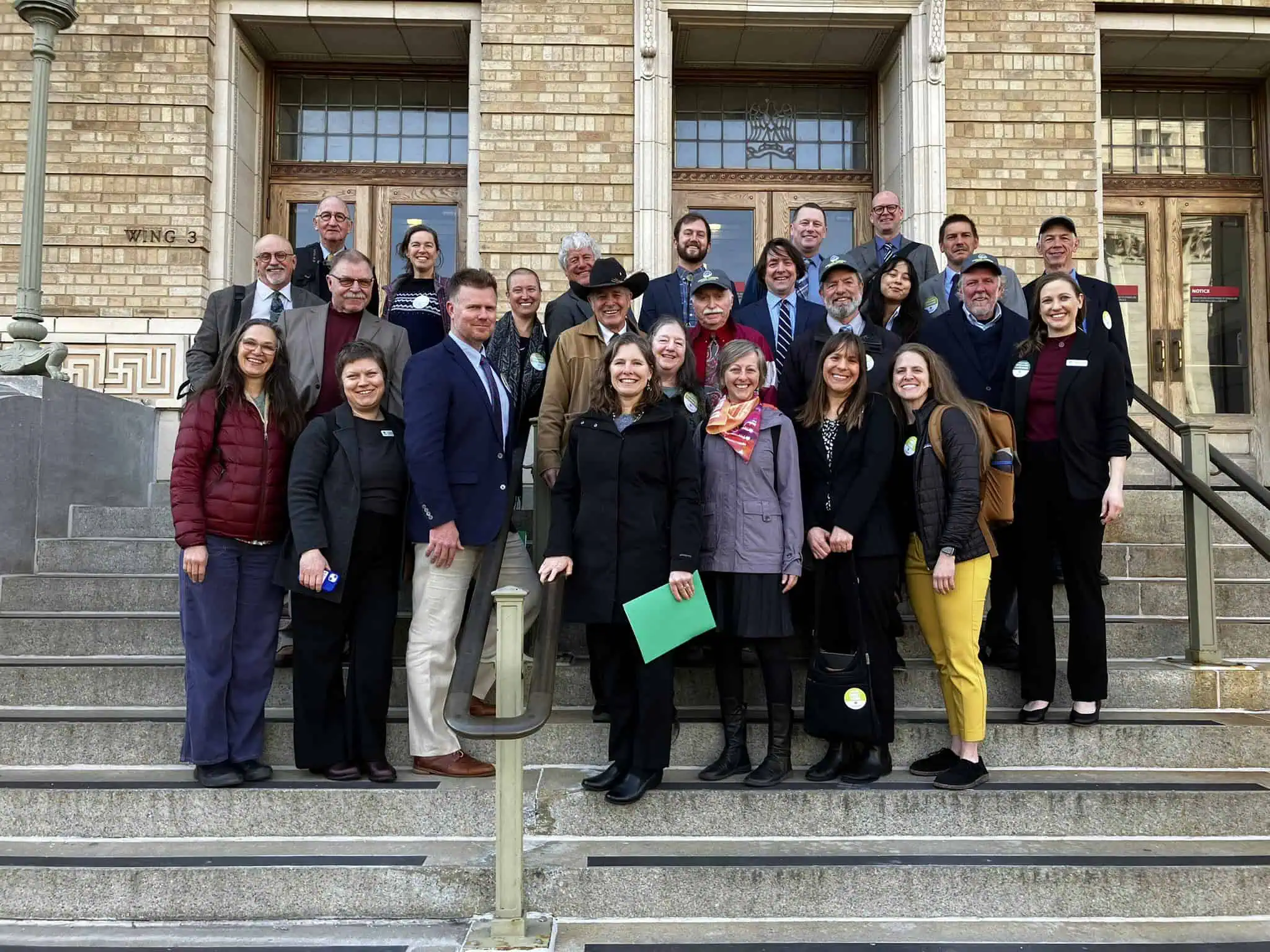
Welcome, Winter 2026 OFA Interns!
Winter Interns Join OFA Ahead of Annual Farmer Fly-In
The Organic Farmers Association has welcomed new interns to the team! The interns will have a unique opportunity to immerse themselves in the world of organic agriculture advocacy as OFA prepares for its annual farmer advocacy day in Washington D.C. in March. The interns will gain valuable insights into the principles and practices of organic agriculture, but will also actively contribute to OFA’s mission of elevating and uniting farmer voices.
The interns are part of the winter Organic Career Network (OCN) cohort. OCN connects organic organizations to students who are interested in exploring career pathways in the organic sector, and aims to provide students with the opportunity to get hands-on experience with organic certification, inspection, advocacy, and farmer education organizations and agencies.
Welcome, Interns!
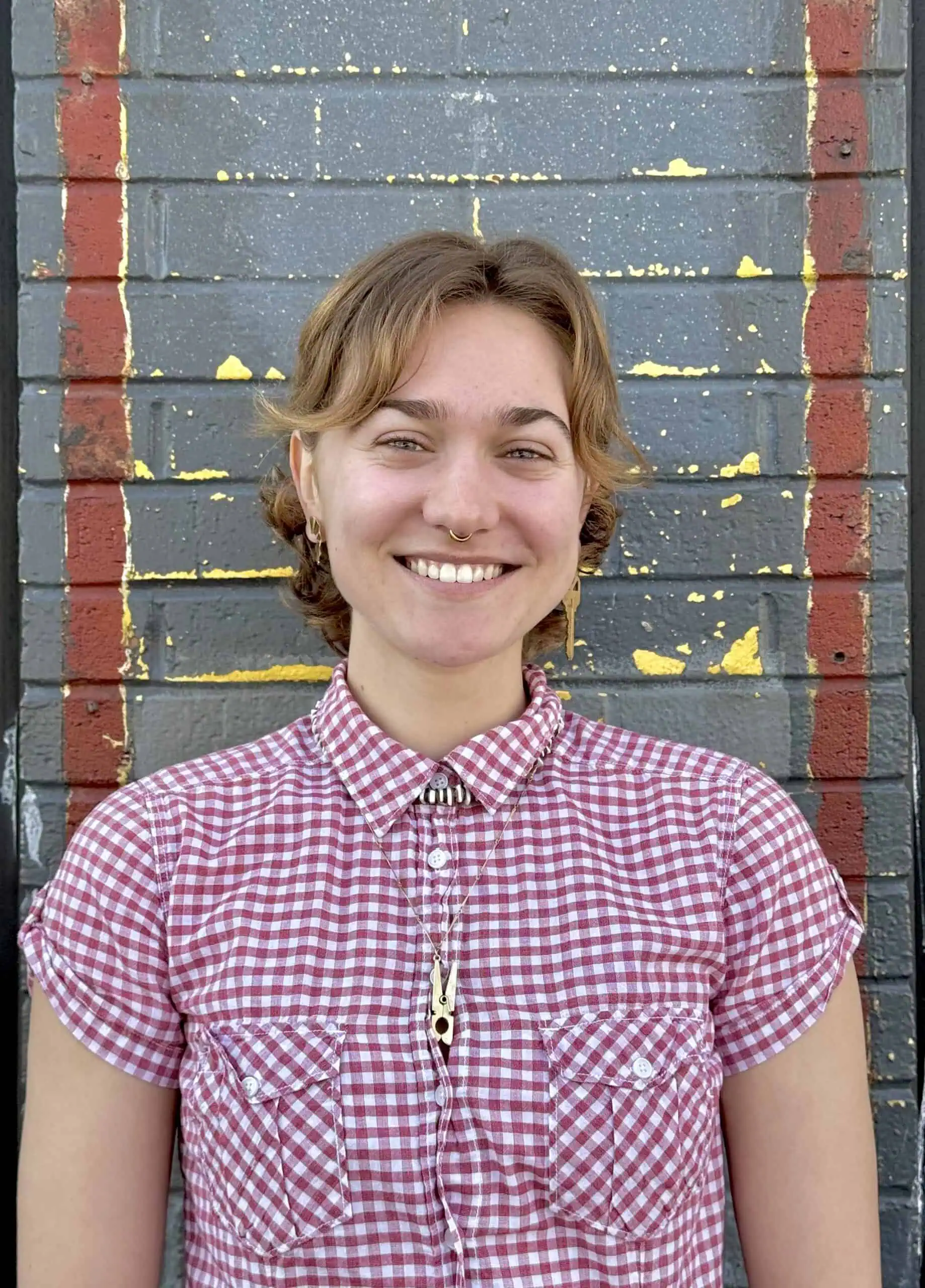
Kendal Thomas
Communications Intern
Kendal is a recent graduate of American University, with a degree in Communications Studies and a Minor in American Studies. Having grown up in rural Pennsylvania and now living in Washington D.C., Kendal has a deep passion for regenerative agriculture, food access, and community building. She is curious about the relationship between farmers and consumers, exploring how to better connect us all to our food system and the earth. Dedicated to utilizing and growing her skills in communications, Kendal is excited for this opportunity to support efforts in organic agriculture.

Anay Shah
Policy Intern
Anay is a freshman at Georgetown University pursuing a B.S. in International Economics with a certificate in Global Development Studies. He is deeply interested in the intersection of economics and agriculture and sees organic farming as a powerful space for more equitable policy and resilient rural economies. On campus, he is involved with the Science Politics journal, DCivitas Consulting, and the GU Jazz Ensemble. At the Organic Farmers Association, he hopes to support advocacy that strengthens individual livelihoods, amplifies the voices of organic producers, and helps reshape food systems to better serve farmers and their communities.
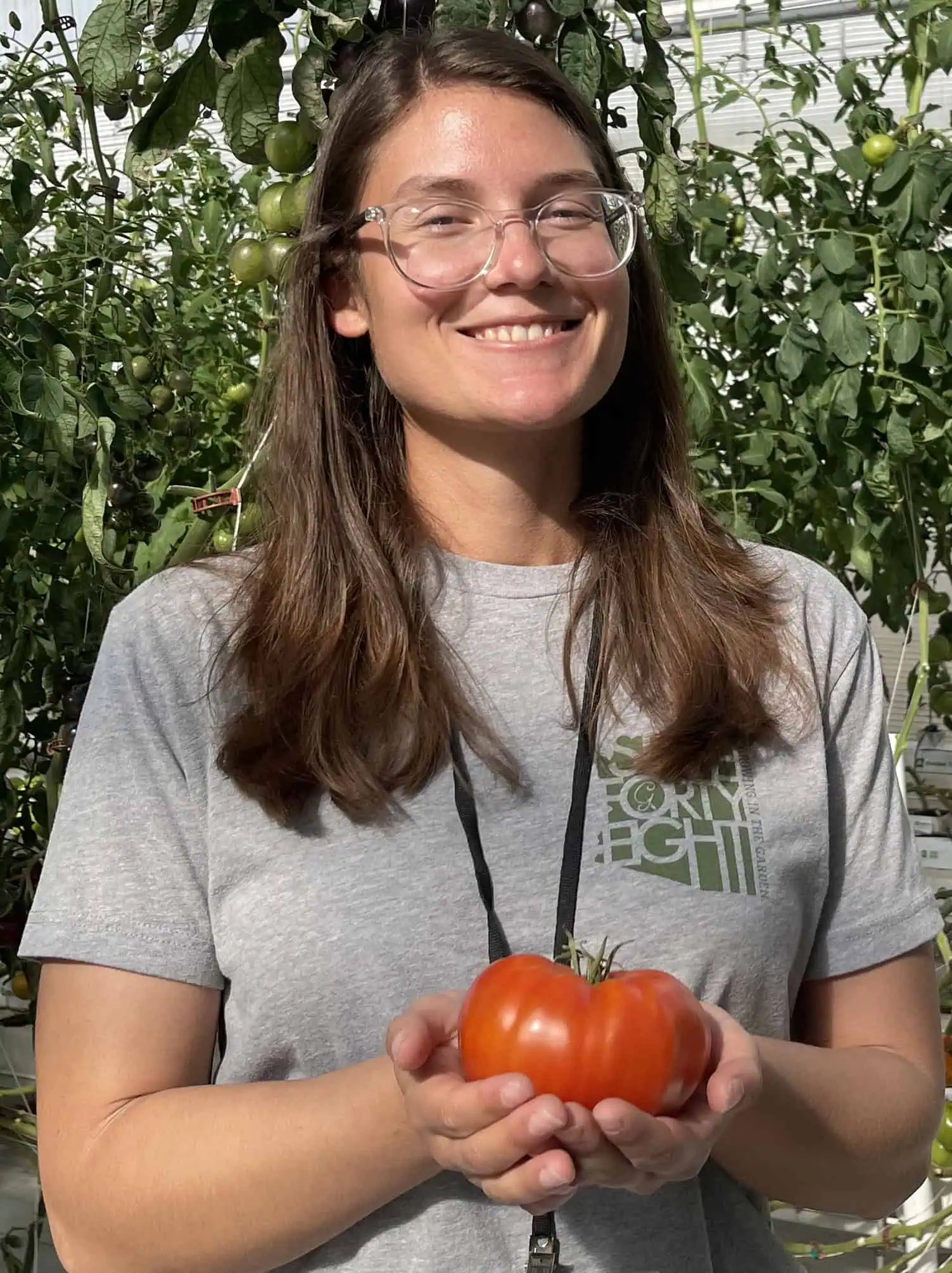
Amanda Ohnmacht
Program Evaluation Intern
Amanda is a graduate student in Sustainable Food Systems at Arizona State University. She holds a BFA in Ceramics with a minor in Applied Biological Sciences from ASU, along with a certificate in Sustainable Agriculture from Mesa Community College. With a passion for small-scale ecological farming, she is committed towards building sustainable and regenerative food systems. Her long-term goal is to establish her own farm rooted in agroecological practices. Amanda is a returning OFA intern who served as the Fall 2025 Farmer Services intern.
NOSB Meeting Summary - Jan. 2026
National Organic Standards Board Meeting Summary
The National Organic Standards Board held its fall 2025 meeting virtually on January 13-14, 2026. This delay was due to the government shutdown in November. Key aspects of the meeting covered compostable polymers, discussions of pear ester for insect management, chlorine used in livestock drinking water, integrating livestock with agroforestry, research priorities, consistency in organic seed use, e-commerce organic labeling, sunset review efficiency, and updates to the NOSB policy and procedures manual, which was postponed until the spring 2026 meeting. The NOP has not yet announced the dates for the spring NOSB meeting.
Compostable Polymers (Biodegradable Plastics)
The NOSB voted against adding compostable polymers (biodegradable plastics), used as compost feedstock on organic land, to the National List as an allowed synthetic. The door remains open for petitions to add a specific item, such as leaf collection bags or fruit stickers. The board did approve a definition for compostable polymers. See OFA’s position on these topics in our written comments.
Sunset Materials
Crops
- The board did not remove any materials scheduled for sunset in 2027.
- The following will remain on the National List for another 5 years: potassium hypochlorite, soap-based algicides, ammonium carbonate, insecticidal soaps, sucrose octanoate esters, Vitamin D3, aquatic plant extracts, lignin sulfonate, fatty alcohols, sodium silicate, EPA list 4 inerts, paper-based crop planting aids.
- Both arsenic and strychnine remain as prohibited natural materials in crops.
Livestock
- The board did not remove any materials scheduled for livestock sunset in 2027.
- The following will remain on the National List for another 5 years: Butorphanol, flunixin, magnesium hydroxide, oxytocin, poloxalene, formic acid, sucrose octanoate esters, EPA list 4 inerts, and excipients.
- Strychnine remains as a prohibited natural for livestock.
- The board voted to change the annotation for oxytocin; this will take effect once the NOP publishes the change in the Federal Register in 18-24 months.
“for use in post parturition therapeutic applications within 3 days of birth. It may not be administered to increase an animal’s milk production or for milk letdown.”
Handling
- The NOSB voted to remove cornstarch from the list of nonorganic agricultural products allowed in organic foods. This will take effect once the NOP publishes the change in the Federal Register in 18-24 months.
- The board did not remove any other materials scheduled for handling sunset in 2027.The board had a robust discussion about agricultural food colors derived from nonorganic fruits and vegetables that have sufficient organic production, but the Board did not achieve the required two-thirds vote to remove non-organic natural colors, so NOP will not require certified organic colors.
Regulatory Proposals
- The NOSB passed the proposal for requiring testing of commodities in the global supply chain, which provides specific details for establishing a testing regime. In the future, the board will continue discussion on notification of fraud within the supply chain, and Unavoidable Residual Environmental Contamination (UREC).
- The board supported a proposal with definitions and future training opportunities for certifier staff and inspectors to focus certifier scrutiny on high-risk operations. This item will remain on the work agenda.
- The NOSB postponed other regulatory agenda items for discussion or vote at the spring meeting.
- The spring agenda will include: Pear ester for insect management, chlorine used in livestock drinking water, integrating livestock with agroforestry, research priorities, consistency in organic seed use, e-commerce organic labeling, sunset review efficiency, and updates to the NOSB policy and procedures manual.
National Organic Program Update
- Import Certificates: Certifier–generated import certificates have been successful in identifying and preventing fraudulent imports, with over 300,000 generated since March 2024.
- Still some loopholes: 30% of import certificates go through the EU or Canada under their equivalency agreements with the NOP, reducing NOP oversight.
- Top Imported Organic Commodities in 2025
- $850 million of beef from Uruguay and Australia
- $450 million of avocados from Mexico
- $250 million of bananas from Ecuador
- $500 million of coffee from Peru and Honduras
- $600 million of whole and processed organic soybeans imported from various countries
- Blueberries from Peru, strawberries and raspberries from Mexico were also in the top 10 Challenges: Difficulty tracking the country of origin for imported processed soybeans and other commodities due to the fact the country-of-harvest is not maintained on the audit trail.
- The NOP is still reviewing past NOSB recommendations on ammonia extracts and highly soluble fertility inputs. The EPA did not identify negative impacts from these materials, but the NOP is still considering the NOSB vote to prohibit these products.
- Update on TDA: The NOP removed the accreditation of the Texas Department of Agriculture’s organic certification program three years ago. TDA repeatedly appealed multiple court decisions; during the 2025 NOP accreditation review, NOP found that TDA had addressed the compliance concerns and re-approved their accreditation.
OFA Welcomes Newly Elected Leadership
OFA Announces Newly Elected Leadership for 2026
Organic Farmers Association (OFA), a national membership organization working to build a strong national policy voice for domestic certified organic farmers, has announced the election of its next Governing Council and Policy Committee members. This leadership term will launch OFA into its 10th year representing organic policy priorities in Washington D.C., and see the organization into its first year as a 501c3 nonprofit organization.
OFA puts farmers in the driver seat to advocate and educate for more domestic organic farms, strong organic standards, and technical assistance and education to support a national growth of organic farming. For the 2026 leadership term, four new Governing Council and Policy Committee Members were elected and 14 leaders were reelected to support a farmer-led national organic farmer movement and national policy platform in support of organic farming.
Governing Council
The Governing Council serves as the governing body of Organic Farmers Association and oversees the health and effectiveness of the organization, ensuring it remains a strong, farmer-led voice for the organic movement.
Policy Committee
The Policy Committee ensures that the diverse voices of organic farmers are represented in critical policy decisions by working with OFA members to set the policy agenda for OFA.
Each OFA region is represented by two certified organic farmers and one regional organic farm organization, making up OFA’s 24 voting certified organic farmer members and 12 advisory organizational members across both leadership bodies. Members are elected by OFA farm members and serve 2-year terms, up to three consecutive terms.
Leadership members are regionally diverse and reflect the national diversity of organic farms. Only our certified organic farm members on the Policy Committee and Governing Council have voting rights, while the organization representatives serve an important advisory role.

The new leadership will officially take their positions during OFA’s Annual Meeting and Farmer Fly-In in Washington, D.C., in March 2026 where OFA members gather to advocate for policy changes that will benefit organic farms and farmers across the U.S.
“This year, we welcome three new organic farmers to our leadership and one new organic organization. Together, they bring decades of organic farming experience to OFA. I’m grateful to our high-quality returning leadership willing to serve another term as well. OFA was created by organic farmers for organic farmers. Their leadership is what makes our national voice authentic, rooted in healthy soil, and focused on what farmers most need to be successful.”
Kate Mendenhall, OFA’s Executive Director
Since its establishment, Organic Farmers Association has worked to build a robust national coalition of certified organic farmers to lead on policy issues important to small- and mid-sized farms curious, transitioning, or currently certified organic. Please join OFA in welcoming and congratulating OFA’s newest leaders!
To learn more about OFA’s leadership roles and responsibilities, please visit our leadership page.
The complete 2026 leadership roster is below and newly elected members are denoted by an asterisk.
CALIFORNIA
For the past 20 years, Sara Tashker has managed Green Gulch Farm’s six acres of cool weather row crops and its enriching apprenticeship program. She wears many hats at the farm, which include planning, training, and marketing, and annually mentors 6-8 beginning organic farmers. In addition to her leadership with OFA, she has served on the Board of Directors for Marin Organic, a consortium of organic growers in her county, for several years.
Since she was a young girl, Rebekah Weber has understood and valued the importance of healthy, organic food. This love of organic food ultimately led to her present role as Policy Director of California Certified Organic Farmers, where she advocates for organic growers. The accomplishments she’s most proud of thus far include establishing a new organic transition program in California and creating a statewide mandate to ensure 20% of all Californian farmland is organic by 2045. She is excited to be a part of OFA’s Governing Council to share perspectives from California growers, contribute to OFA’s strategic vision, and continue to build bridges between CCOF and OFA.
As a farm kid on his family’s organic dairy, Zach has understood the world and value of organic farming since he was a young child. After earning his BS degree in Agribusiness at CSU, Zach returned home to manage the family’s organic dairy, a 550 Jersey year-round farm which is one of few left in a consolidating milk shed. He is passionate about advocating for the organic dairy industry, and has served on a variety of boards and committees, including the Western Organic Dairy Producers Association (WODPA), Western United Dairymen (WUD), and the Dairy and Soil Health Committee for the Humboldt County Resource Conservation District (HCRCD), to do just that.
Grace brings a diverse background and skillset to the Policy Committee as a result of her policy work with the California Climate and Action Network (CalCAN) and on the ground work at small-scale sustainable and diversified vegetable farms in Georgia and Colorado. In her current role as Program Manager at Community Alliance with Family Farmers, she works directly with farmers on organic transition, certification, and food safety compliance. Grace is most excited to bring her authentic connection to a diverse group of small-scale growers in California, a growing understanding of the organic farming policy landscape, and active listening skills to OFA’s work.
MIDWEST (Missouri, Illinois, Indiana, Michigan, Ohio, Pennsylvania)
Dave Bishop and his family own and operate PrairiErth Farm, a 450-acre diversified farm in central Illinois. They produce corn, soybeans, wheat, vegetables, beef, pork, eggs, and honey. The farm has been certified organic since 2004. Dave serves on the Sustainable Ag Advisory Committee for the Illinois Department of Agriculture, and on the Governing Council of the Organic Farmers Association. He teaches regenerative agriculture at Heartland College in Bloomington. The Bishops’ farming practices have garnered numerous awards: They are the 2017 Midwest Organic & Sustainable Education Service (Marbleseed) Organic Farmers of the Year, and recipients of the 2018 RJ Vollmer Award for Sustainable Agriculture from the Illinois Department of Agriculture. In 2019, PrairiErth Farm was one of seven US farms recognized by “Good Food 100” Restaurants and the James Beard Foundation for their dedication to sustainability, transparancy, and advancing good food.
In 2018, Jacquelyn left her position as Executive Director for Sangamon Valley Youth Symphony to jump into the world of community based food systems to support the growth and transformation of The Land Connection as its newest Executive Director. Throughout her tenure, she has grown the budget by 400%, and supported the development and implementation of two programs: Illinois FarmLink and a consumer education initiative. She has also implemented crucial policies, systems, and procedures to ensure The Land Connection’s health well into the future. Apart from her role at The Land Connection, Jacquelyn maintains an active piano studio in the Champaign-Urbana community, and enjoys spending time with her pets, cooking, and all things outdoors.
Harold Wilken is a lifelong farmer. He owns and operates a multi-generation family farm that raises hybrid and heritage corn, soybeans, wheat, and rye to supply large and small food companies, brewers, and distillers, and transitioned to organic methods in 2003. He has grown the farm from a 33-acre field to the current 3,000 acre property with his son, nephew, and other team members. To further grow the organic industry, Harold has served on many panels and mentored new organic farmers, and was named one of Marbleseed’s 2023 Farmers of the Year, alongside his son Ross. Harold remembers the way his grandparents farmed, and seeks to leave the soil, deeper, richer, and healthier than he found it.
NORTH CENTRAL (Nebraska, North Dakota, South Dakota, Minnesota, Iowa, Wisconsin)
Joe has always been passionate about dairy farming as a great way to work with family while preserving and maintaining natural fertility in the soil. Because he lost faith in having to rely on so many drugs, hormones, and chemicals and the deteriorating condition of the land, he adopted biological principles to improve it. Joe farms with his wife and three of their sons. They own 800 acres and rent another 400. The farm has been organic certified since 2004 and markets its milk through Organic Valley/CROPP Co-op. Joe is the general manager of the farm but will be transitioning more of the responsibilities to his sons over the next few years.
Margaret co-manages a 600-acre organic grain, forage, and livestock farm near Hampton with her husband, Doug. She also works as an agronomist for Albert Lea Seed to market organic and non-GMO seed. Prior to moving to Albert Lea Seed in 2018, she worked for Iowa State University as a Value Added Agriculture Extension Specialist for over 25 years. Her education includes a Master’s from Iowa State in Crop Production & Physiology and a PhD from the University of Wisconsin-Madison in Crop Ecology & Production. Margaret has been involved in a variety of projects, from working with African farmers in Uganda and Swaziland to Annie’s Project, course development, and on-farm research.
20 years ago, Andrew and his wife began the process of buying into a dairy farm. Today, they own and operate Prime Pastures Organic Dairy, an 800 acre farm which uses robotic technology to milk 150 cows and grows organic crops for herd feed and the larger organic grain market. Andrew is a strong organic advocate who has served on his local Sustainable Farming Association board, Westby Coop Creamery Board, and hosted many field days on his farm with various groups. He enjoys frequently talking to other producers in his region and working on legislation to aid organic dairy farmers.
WESTERN (Alaska, Hawaii, Washington, Oregon, Nevada, Arizona, Idaho, Utah, New Mexico, Montana, Wyoming, Colorado, Kansas)
Despite being a farm owner since 2009 and farming himself since 2016, Pryor still calls himself a beginning farmer. That’s because Pryor spent most of his career before farming as a patent lawyer. While Pryor was a dedicated gardener for many years, he always thought he’d be a landowner one day. His experience growing his own food had long ago converted him to believing that organic is the healthiest way to eat, and that what’s good for us to eat is also more likely to be sustainable in the face of climate change and in the face of system disruptions. When Pryor was ready for a change, and as the farmers who rented his farm moved on, he began farming. He received advice from NRCS and Oregon Tilth and worked toward today where his 92-acre farm specializes in growing certified organic wheat and other small grains for food, seed, and animal consumption. Successfully farming with just organic practices is very difficult, Pryor shared. A lot of expertise is needed and he’s still learning, but Pryor believes if he can do it, others in the region may see the opportunity as well. Currently, 62 acres are certified organic or in transition toward organic certification. But Pryor knew there was more he could offer to the organic movement than just farming alone. When Oregon Tilth asked if he’d be interested in policy work, he knew he could use his skills as a lawyer to advocate in favor of positions that would protect and promote further development of organic agriculture.
With her knowledge gained from a Master’s degree in Plant and Soil Science and a PhD in Plant Pathology, Linley and her family have worked tirelessly to be the proud owners of Adobe House Farm, a goal 10 years in the making. Since they first began working the land as renters one decade ago, Linley has farmed three acres of vegetables, which she sells to local restaurants, the SWFF Local Distribution Cooperative, James Ranch, and the Durango Farmers Market. Her experience of purchasing and growing a farm has given Linley first hand exposure to the challenges new organic farmers face to start and succeed, and she is passionate about ensuring USDA organic standards and enforcement to maintain healthy soil and pasture. In addition to helping her family farm, she is the Associate Director of the Real Organic Project by day and tomato pruner extraordinaire by night.
SOUTHERN (Texas, Oklahoma, Arkansas, Louisiana, Mississippi, Alabama, Georgia, Florida South Carolina, North Carolina, Tennessee, Kentucky, Virginia, West Virginia, Maryland, U.S. Virgin Islands, Guam, Puerto Rico, Northern Mariana Islands, American Samoa)
Throughout his 10 years as a certified organic farmer, Jesse has understood the value and integrity of the organic label. On the farm at Ole Brook Organics, he grows mixed vegetables, melons, and produces private label turmeric powder and tea in his role as the President and chief row maker, planter, and harvester. Because he believes so deeply in the organic way of farming, he served as a member of the Executive Committee and Policy Committee, Chairman of Crops Committee, and Vice Chair of the Livestock Committee on the National Organic Standards Board (NOSB) to maintain the credibility, viability, and verifiable standards of the USDA organic seal.
Ever since her work on Italian farms over two decades ago, Brooke has been committed to strengthening organic food and farming systems in the United States. She has diverse experiences which include developing youth urban agriculture programs in New York City, serving as the Executive Director at Mother Hubbard’s Cupboard, a community food pantry in Indiana, and teaching undergraduate students at the University of Kentucky College of Agriculture, Food and Environment. As a current member of the Organic Association of Kentucky (OAK), Brooke melds a passion for farming, organic practices, education and advocacy to support OAK’s growing programs and state-wide farmer network.
For the past 21 years, Michael and his partner Emily have run Three Springs Farm, which grows a wide variety of vegetables that are sold through their CSA, to local restaurants, and to food banks. Michael started the first Double Up Food Bucks program in Oklahoma, and the farm was also the first to accept SNAP benefits in Oklahoma. He is passionate about strengthening organic standards and making farming policies more organically focused. As a result, he and his partner are currently working to prevent CAFO poultry operations from expanding in their area.
NORTHEAST (New York, Vermont, New Hampshire, Maine, Massachusetts, Rhode Island, Connecticut, New Jersey, Delaware)
Michael and his wife Karma have farmed organically for over 25 years. Over that time, he has been a strong advocate through their direct marketing, as well as by educating other farmers through internships, farm tours, mentoring, speaking at local and regional conferences, and writing articles. The Gloses have farmed together since 1996 and became certified in 1998. They market through the vibrant Ithaca farmers market as well as their self-serve on-farm store and greenhouse.
Bill Pluecker has been farming commercially since 2005. During most of those years, his operation was certified organic and operated a CSA (Community Supported Agriculture) program. Bill works for the Maine Organic Farmers and Gardeners Association (MOFGA) to engage the community in taking action to support clean soil and water, with an emphasis on addressing PFAS contamination of farmland and on building awareness and advocacy on this topic nationwide. Bill has served in the Maine Legislature since 2018. In a world that encourages farmers to engage in a race to drive profits into a corporate food system, Bill believes organic farmers and the industry stand as a sector that celebrates farmers, farms, and the environment that makes them possible.
Doug began Murphy’s Grass Farm from scratch in 1977, and still operates the 450 acre, 100 cow organic grass-based dairy. Over the course of his work in the organic farming space, he has seen the values of faith and dogma evolve into science and truth. Today, with the aid of his skills as a medical physician, Doug believes deeply in the growth and continuity of organic farming, and looks forward to his work as part of the Governing Council at OFA.
The History of National Organic Farmer Movements, and the Founding of the Organic Farmers Association
In honor of the Organic Farmers Association’s 10 year anniversary in 2026, we wanted to recount a small piece of America’s organic history and recognize the groups, movements, and people that led to the creation of this organization. The entire history of organic agriculture is nearly as old as human civilization; recounting our current organic movement cannot overshadow centuries of agricultural innovation. In North America, Indigenous peoples managed regenerative organic agricultural systems for thousands of years before European settlers arrived. Following colonization enslaved people and migrants continued to influence organic practices and principles in the United States. Within this larger history, the current U.S. organic movement, which is in essence a modern adaptation of indigenous knowledge from around the world, has just been around for under a century.
Early U.S. Organic History
In 1940, J.I. Rodale founded the Rodale Organic Gardening Experimental Farm in Pennsylvania, (1) educating readers across the country about organic principles and techniques through his magazine. In the 1950’s the U.S organic movement saw a groundswell of momentum as public awareness about the health and environmental impacts of synthetic agricultural chemicals grew. The 1960s counterculture motivated back-to-the-landers to begin organic farms across the country, and by the 1970s, people were organizing around the concept of organic.
Maine Organic Farmers and Gardeners Association (MOFGA) (2) and the Northeast Organic Farming Association of Vermont (NOFA-VT) (3) both formed in 1971. IFOAM-Organics International was formed in 1972, (4) California Certified Organic Farmers (CCOF) was founded in 1973, (5) followed by Oregon Tilth in 1974, (6) and the Organic Growers and Buyers Association (MN) in 1976. (7)
Consumer interest continued to grow through the 1970s and 80s, leading to a growing number of organic farmers and processors to meet this demand, and more state organizations and organic certification bodies to support these growers. Though the federal government declined to regulate this growing industry, these organic farming organizations created early standards for organic certification. Some state legislatures also saw the need to establish standards for certified organic foods, and in 1973, Oregon became the first state to pass a law defining the term “organic.” By 1997, 40 organic certification agencies–12 state and 28 private or nonprofit– conducted third-party organic certification. (8)
Despite having a shared goal, the process by which individual states and other certification agencies regulated organic agriculture differed. While general organic principles were similar, the rigor and enforcement of the regulations across states and certification agencies were inconsistent. (9)
While having a nonuniform standard state-by-state may have been confusing for consumers, it actually awarded farmers significant power when it came to setting certification standards. Founder of the International Organic Inspectors Association and former NOSB chair (certifier seat), Jim Riddle recounts that prior to the formation of OFA (and other current organic coalitions, boards, and associations), organic certification agencies provided a place for organic farmers to engage in determining what certification standards would look like. Additionally, some certification organizations were involved in research, education, and advocacy, and represented farmers in local and regional issues.
However, as the organic sector continued to grow in popularity and see commercial expansion, conflicting state and private organic labels became a greater issue, and by the late 80s, stakeholders of the organic sector recognized a need for a single standard. (10)
Engaging On the National Level
Concerned environmental and consumer groups demanding clear, uniform organic standards, and farmers and processors seeking solutions for interstate commerce, brought the issue of inconsistent organic standards to the national stage.
As a result, members of the U.S. Senate Committee on Agriculture, Nutrition, and Forestry (led at the time by Senator Patrick Leahy) started working on an act to be included in the 1990 Farm Bill (11) that would establish national organic food standards, which we now know as the Organic Foods Production Act (OFPA).
Aware of the changes to come, in 1989, at an organizing meeting in Leavenworth, Kansas, (12) farmers and representatives from organic farmer organizations founded the Organic Farmers Association Council (OFAC) an “autonomous constituency group” within the Organic Trade Association (OTA), then called Organic Foods Production Association of North America (OFPANA). (13)
Members of OFAC (see the list here) primarily represented small certification and organic farmer organizations around the country, and is now widely recognized as the first organization that mobilized organic farmers nationally in order to amplify their collective voices.
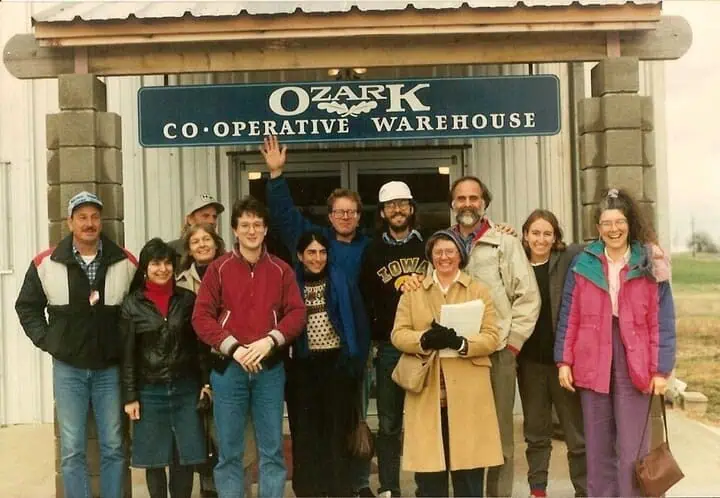
While OFAC remained active into the 90s, the group lost momentum following the passage of the 1990 Farm Bill. Many members couldn’t afford the frequent meetings or the time away from the field, and at a 1994 meeting, the group officially dissolved.
Though the OFPA had passed, there was still a decade-long public debate before national organic regulations were finalized and officially went into effect in 2002.
During this time of negotiation, the USDA published a highly contentious first draft of the organic program rule in 1997 that allowed what we now know as “the big three” (genetically modified crops, sewage sludge, and irradiation) in organic production. (14) In response, hundreds of thousands of citizens made public comments criticizing the USDA’s failure to uphold organic integrity in our national standards.
Fortunately, even with the absence of OFAC, organic farmers were still well represented in these discussions through farmer-led organic organizations across the country. The National Campaign for Sustainable Agriculture (now NSAC) was on the rise, and its Organic Committee stepped into the gap left by OFAC, bringing farmers to D.C. and training them to lobby for themselves and testify at hearings.
Additionally, four farmers were represented on the NOSB, and NOSB meetings around the country were well attended by organic organizations and organic farmers who provided testimony on behalf of farmer priorities.
Though the final National Organic Program (NOP) regulation was far from perfect, the voices of consumers and farmers helped to improve it significantly, setting more meaningful standards for organic certification that prevented the “big three” and other harmful additions from being included in the final rule.
Farmer Organization after OFPA
Following the long-anticipated 2002 implementation of organic regulations through the NOP, the industry saw several changes
An unintended consequence of implementing the NOP was that it established stricter rules to prevent conflicts of interest within certifying organizations; (15) thus limiting certifiers’ ability to be involved in advocacy and education. As a result, many certifiers split into two joined entities so they could safely provide both the education and technical assistance farmers needed, as well as continue to provide local organic certification services. However, some agencies elected to either discontinue their certification services or their education and advocacy support for farmers. This change affected state and regional organic farmer movements and, in some cases, led farmers to reduce their engagement within these organizations, where previously their voices had a direct impact on organic standards at the local level. But organic farmer leadership remained strong in organizations focused on farmer-to-farmer information sharing, creating an organized organic extension network to support a growing organic market and advance farmer-led advocacy for organic integrity.
When OFAC dissolved, it left a gap in organic advocacy. The group formerly provided a collective organic farmer voice within OFPANA, now the Organic Trade Association (OTA), but following OFAC’s dissolution, OTA lost much of its farmer membership. The OTA 2002 Board noted reincorporating a farmer voice in OTA work was important, (13) yet the lack of a national organic farmer voice made realizing this intention more difficult.
The National Campaign for Sustainable Agriculture merged with the Sustainable Agriculture Coalition in 2009, becoming the National Sustainable Agriculture Coalition (NSAC). (16) During the years leading up to this merger, the Organic Committee lacked the protected space to monitor and advocate for strong organic standards that upheld farmers’ and consumers’ shared vision for organic integrity. In 2003, the National Organic Coalition (NOC) was formed by an alliance of organizations (17) seeking a platform for diverse stakeholders—from farmer organizations to food businesses, consumers, and environmental groups—to share perspectives and advocate for organic interests in Washington, D.C.
Multiple Turning Points
It is difficult to say who first recognized the need for a national organization for organic farmers, but there are many accounts of farmers and stakeholders discussing the need for such an organization throughout the 2000s.
In 2006, noting the lack of a clear vision for the future of the US organic industry, leaders at the Rural Advancement Foundation International-USA (RAFI-USA) and NOC launched the National Organic Action Plan. (18) This plan, modeled after organic action plans in Europe, was meant to establish clear industry benchmarks and motivate coordinated efforts to grow the US organic industry. To create this plan, dialogue meetings were hosted in 28 states, engaging 300 participants in day-long discussions about the future of organic agriculture. Jim Riddle, who was on the NOAP planning team and later chaired OFA’s Steering Committee, recalls that while meeting with organic stakeholders to discuss NOAP priorities, establishing a national Organic Farmers Association was clearly identified as a need and NOAP recommendation. (19)
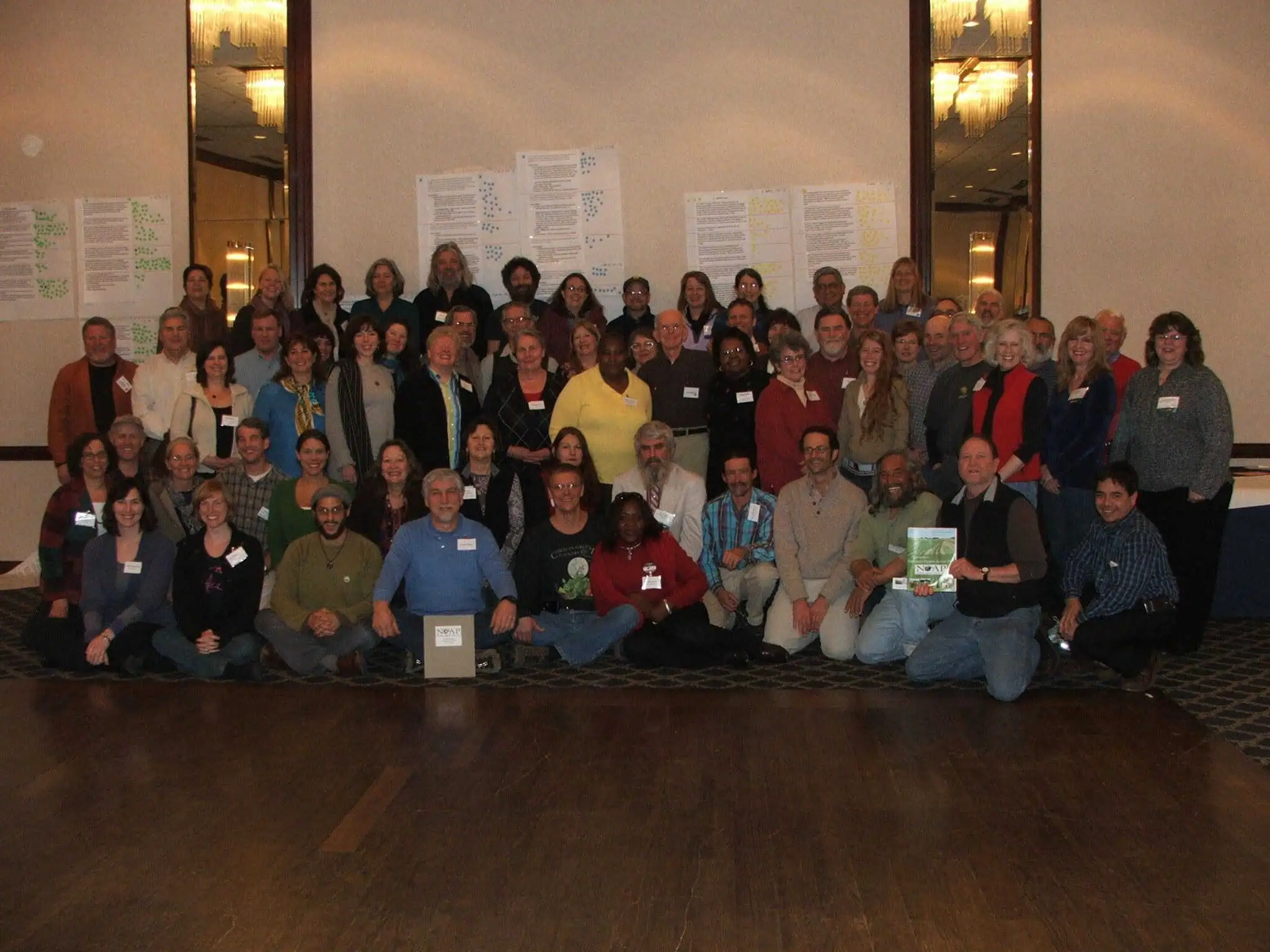
Meanwhile, tensions were building within the organic industry as OTA pushed forward with a policy to create an organic commodity checkoff program that farmers were largely against. (20) In response, the No Organic Checkoff coalition, a group of organic farmer member organizations and businesses, was formed to provide a farmer voice to counter this effort. (21) Though much smaller than OFAC, this was the second time organic farmers were seen mobilizing nationally. Some farmers and farm organizations previously involved with OTA felt underrepresented and saw the need for a new separate organization focused on organic farmer priorities. Even those who were satisfied with the work of NOC recognized the importance of having a farmer-only voice in the national organic conversation.
What are Checkoff Programs?
Checkoff Programs are dedicated to promoting or researching specific agricultural commodities. Producers and handlers selling any of 22 commodities (including milk, pecans, and mangos) are required to pay a small tax on marketed products to fund national research and promotion boards administered by the USDA Agricultural Marketing Service. The proposed organic checkoff could have taxed all organic producers and handlers to support promotion of individual organic sectors as well as all organic. As of 2016, organic producers are exempt from paying into conventional checkoff programs. Learn more here
Early OFA
Bob Quinn, a Montana organic farmer, and Michael Sligh, a North Carolina organic farmer and Policy Director at RAFI-USA, both served on the first NOSB in 1992 and reconnected two decades later. Realizing that they had both unknowingly been working towards the same goal of forming a national organic farmer organization, with Quinn connecting with farmers in the West and Sligh mobilizing farmers in the rest of the country through NOAP and NOC, they combined forces to create an Organizing Committee of the Organic Farmers Alliance (OFA) with fewer than 10 members.
Membership on the OFA Organizing Committee grew as organic farmers and organic farm organizations learned of the effort, and in 2015, this group of volunteers contracted with Kate Mendenhall, now the executive director of OFA, to help facilitate this committee, survey farmers nationally to assess farmers’ interest in a national organic farmer voice, and then direct the creation of this organization.
The founding OFA Organizing Committee members appointed the first OFA Steering Committee in 2016 representing two organic farmers from each of OFA’s six regions and one organizational representative from each region for an interim 18-month term to work with the Organizing Committee to review, discuss, edit, and ratify the foundational principles, bylaws, policies, and procedures for how a national Organic Farmers Alliance would function, communicate, and take action, and prepare for the first national election of OFA leadership in 2018.
Around this same time, OFA learned from Jeff Moyer that Rodale Institute had also been working to create a national organization for organic farmers called the Organic Farmers Association.
Both the Alliance and Rodale Institute believed that having two similar organizations would disorganize the movement, so they discussed a merger. While OFA had done the grassroots work of organizing farmers, they didn’t have much in the way of financial means, so it quickly became clear that merging with Rodale Institute as the group’s fiscal sponsor would be mutually beneficial.
Finally, at a 2017 meeting in Lacrosse, WI, the Organizing Committee and Steering Committee voted on the merger, and the Organic Farmer Alliance became what we now know as the Organic Farmers Association (OFA). Later that year, OFA farm members elected its first Policy Committee and held its first meeting on October 10, 2017, via conference call. OFA elected its first Governing Council to replace the appointed Steering Committee in March 2018.
A month later, it held its first advocacy day in Washington, D.C., bringing farmers from across the country to educate Congress on organic farmer priorities and advocate for policies that strengthen organic farms. In 2020, OFA was established as an independent 501(c)(5) nonprofit organization and also maintained a fiscal sponsor relationship with Rodale Institute for educational programming support. And, as of a few weeks before this article’s publication, OFA was granted 501(c)(3) status, launching a new era in our journey and a fitting milestone to mark a decade of meaningful work.
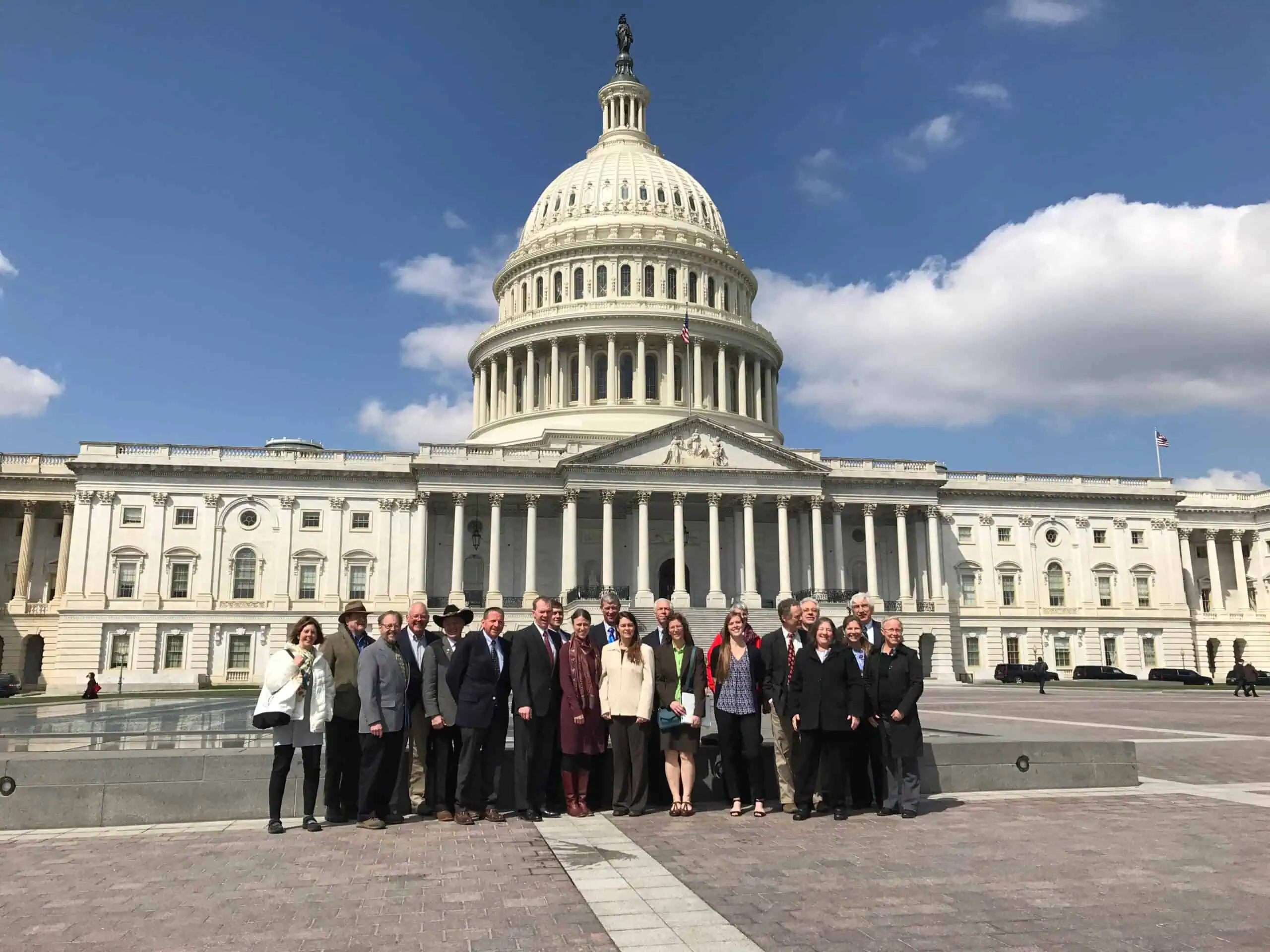
This article was originally published in the November 2025 Organic Voice magazine, and research and written by OFA Communications Intern Aparna Nidamanuri.
Help us document history! Send OFA your photos (from the past or present) here.
Sources
1. Our Story. Rodale Institute. https://rodaleinstitute.org/about/our-story/
2. A Brief History of MOFGA. Maine Organic Farmers and Gardeners Association. https://www.mofga.org/mofga-history/
3. History. Northeast Organic Farming Association of Vermont. https://www.nofavt.org/about/history
4. Our History & Organic 3.0. IFOAM Organics International. https://www.ifoam.bio/about-us/our-history-organic-30
5. Our History. California Certified Organic Farmers. https://www.ccof.org/about/history/
6. Mission. Oregon Tilth. https://tilth.org/about/mission/
7. Carmen Fernholz Papers. Wisconsin Historical Society. https://digicoll.library.wisc.edu/cgi/f/findaid/findaid-idx?c=wiarchives;cc=wiarchives;view=text;rgn=main;didno=uw-whs-mss01164
8. Greene, C.R. (2001). U.S. Organic Farming Emerges in the 1990s: Adoption of Certified Systems. USDA ERS. https://ers.usda.gov/sites/default/files/_laserfiche/publications/42396/31544_aib770_002.pdf
9. Ellsworth, J. (2001). The History of Organic Food Regulation. Harvard Library. http://nrs.harvard.edu/urn-3:HUL.InstRepos:8889458
10. OFPA & NOSB. National Organic Coalition. https://www.nationalorganiccoalition.org/ofpa-nosb
11. S.2830 – 101st Congress (1989-1990): Food, Agriculture, Conservation, and Trade Act of 1990. (1990). https://www.congress.gov/bill/101st-congress/senate-bill/2830/text
12. 1989-1994 OFAC Organic Farmers Association Council. Roger Blobaum. https://rogerblobaum.com/organic-farmers-associations-council-ofac/
13. DiMatteo, K. & Gershuny, G. (2007). The Organic Trade Association. Organic Farming: an International History. https://www.cabidigitallibrary.org/doi/pdf/10.5555/20073257649
14. National Organic Standards. Beyond Pesticides. https://www.beyondpesticides.org/programs/organic-agriculture/keeping-organic-strong/national-organic-standards
15. 7 CFR 205.501 https://www.ecfr.gov/current/title-7/part-205/section-205.501
16. History and Accomplishments. National Sustainable Agriculture Coalition. https://sustainableagriculture.net/about-us/history/
17. National Organic Coalition. RAFI-USA. https://www.rafiusa.org/programs/just-foods/national-organic-coalition/
18. The National Organic Action Plan (NOAP). RAFI-USA. https://www.rafiusa.org/programs/just-foods/national-organic-action-plan/
19. (2010). National Organic Action Plan (NOAP): From the Margins to the Mainstream: Advancing Organic Agriculture in the US. RAFI-USA. https://www.rafiusa.org/national-organic-action-plan-2/
20. (2018). USDA Rejects Organic Checkoff Proposal. Cornucopia Institute. https://www.cornucopia.org/2018/05/usda-rejects-organic-checkoff-proposal/
21. (2018) No Organic Checkoff Coalition applauds USDA finalizing organic farmers’ exemption from commodity check-offs. NODPA. https://nodpa.com/n/80/No-Organic-Checkoff-Coalition-applauds-USDA-finalizing-organic-farmers-exemption-from-commodity-check-offsz
When Your Choices Align: A Giving Tuesday Partnership Built on Shared Values
Bluestone Life to Match Donations & Amplify Organic Farmer Voices
You already know your choices matter.
Every time a farmer transitions to organic they’re protecting our food system, and every time someone supports a local organic farmer they’re backing those who prioritize land stewardship for future generations. These aren’t just profit and purchasing decisions—they’re values in action.
This Giving Tuesday (December 2), those same values can amplify the voices of organic farmers working to change policy in Washington, D.C. Thanks to our partnership with Bluestone Life, again this year every donation up to $5,000 will be matched, doubling your impact for the farmers leading the organic movement.
Farmer Voices Rising
OFA is powered by farmer members whose voices demand policies that work for the people who actually work the land and not corporate interests. Organic farmers don’t take shortcuts. They build healthy soil as the foundation for nutritious food, thriving ecosystems, and resilient communities. It takes more time, more attention, more commitment to do what’s right over what’s easy.
Bluestone Life operates the same way. They’ve reimagined life insurance, a product every family needs, as a tool for systems change. They invest your premiums in values-driven nonprofits, not extractive markets. Plus, they’re a certified B Corp, meeting rigorous standards for social and environmental impact.
The connection is simple: both organic farmers and Bluestone Life believe that how you do business matters as much as what business you do.
And if you’re reading this, you’re already living these values. You think carefully about where your food comes from and the manner of how it comes to be. You support farmers building a better system. You align your dollars with your beliefs.
So will you stand up for organic food and farms on Giving Tuesday and support OFA’s work in 2026?
How Your Matched Gift Works
When you invest in OFA, you invest in a future where policy is written by the people who steward the soil, not the corporations that profit from it. OFA relies on donations, memberships, and fundraisers like this one to exist. Your support funds the work that matters most:
- D.C. Fly-Ins that bring farmer voices directly to legislators
- Marker bills that set the stage for real policy victories
- Farmer support and resources that help growers navigate an increasingly complex system
This Giving Tuesday, every dollar you give, up to $5,000 total, will be matched by Bluestone Life. That means your $50 becomes $100. Your $250 becomes $500. Your matched donation amplifies organic farmer voices demanding fair markets, conservation support, and the infrastructure organic farmers need to thrive.
The noise in Washington is loud. The challenges are real. But when we align our choices we create strength together.
Make Your Choice Count
If you believe in the work OFA is doing, will you make a donation on Giving Tuesday to double the impact of your donation and help us jumpstart our 2026 policy priorities?
This Giving Tuesday, your donation does more than support organic farmers. It proves that values-driven choices, made consistently across every part of our lives, can transform broken systems.
Bluestone Life gets it. Organic farmers live it. And you’re already doing it.
Now let’s amplify it together.
Learn more about Bluestone Life at bluestonelife.com
Would you prefer to mail in your donation? Please make a check payable to Organic Farmers Association and mail to PO Box 709 Spirit Lake, IA 51360. Questions? Reach out at 202-643-5363 or info@OrganicFarmersAssociation.org.
Welcome, Fall 2025 OFA Interns!
Fall Interns Join OFA to Gain Hands-On Experience in Organic
The Organic Farmers Association has welcomed three new interns to the team this fall! The interns will have a unique opportunity to immerse themselves in the world of organic agriculture advocacy. They will not only gain valuable insights into the principles and practices of organic farming, but will also actively contribute to OFA’s mission of elevating and uniting farmer voices.
The interns are part of the fall Organic Career Network (OCN) cohort. OCN connects organic organizations to students who are interested in exploring career pathways in the organic sector, and aims to provide students with the opportunity to get hands-on experience with organic certification, inspection, advocacy, and farmer education organizations and agencies.
Welcome, Interns!

Amanda Ohnmacht
Farmer Services Intern
Amanda is a graduate student in Sustainable Food Systems at Arizona State University. She holds a BFA in Ceramics with a minor in Applied Biological Sciences from ASU, along with a certificate in Sustainable Agriculture from Mesa Community College. With a passion for small-scale ecological farming, she is committed towards building sustainable and regenerative food systems. Her long-term goal is to establish her own farm rooted in agroecological practices.

Aparna Nidamanuri
Communications Intern
Aparna currently lives in Illinois, where she was born and raised. She graduated from the University of Minnesota in 2024, with a BS in Agriculture and Food Business Management. While in school she interned both in the public and private sectors and was able to narrow down her interest in sustainable movements after being exposed to many facets of the food system. For the past year she did Americorps, serving the communications and development team of a non profit food hub in Rhode Island that primarily focused on building market opportunities for local producers, and promoting local eating. Right now she is studying for the GRE, and hopes to eventually get a masters degree in economics.

Assata Makonnen
Policy Intern
Assata is a sophomore at the University of Maryland College Park, where she pursues a B.S. in Environmental Science and Policy with a minor in Sustainability Studies. On campus, she is a member of the environmental science and policy student advisory board ENSPire, the Jimenez-Porter Writers’ House, the University Student Judiciary, Maryland Mock Trial, and serves as the head of the UMD Chapter of the nationwide organization, Plant Futures Initiative. She is particularly passionate about the intersection between the natural world and people/society, which is what led her to join the Organic Farmers Association. Through pursuing a career in environmental law, she hopes to advocate for marginalized voices within the environmental community and push for a revision of current food systems to prioritize organic, regenerative, and sustainable living.
Attention Farmers Marketing to Whole Foods Market!
If your farms work with Whole Foods Market, you may have received communications indicating you needed to sign up for a specific invoicing system being managed by SPS Commerce. This annual subscription invoicing system is expensive and not a good fit for many OFA farmers selling to Whole Foods.
After Member Farmers raised this concern with OFA, we called a meeting with the Whole Foods Team and the farmers being affected. Whole Foods indicated that this switch is NOT REQUIRED, and that other options will be made available to farmers who do not want to sign on to the SPS invoicing system.
The Whole Foods Team shared this message:
“Whole Foods Market is moving toward digital invoicing. At this time, partnering with SPS Commerce is optional for vendors—not mandatory. In the future, additional options related to digital invoicing will be communicated to the vendor population. We appreciate our farmers and thank them for their patience as we work to find what’s best—from farm to store to customer.”
—Sofia Angeles – Team Leader, Supplier Enablement at Whole Foods Market
OFA works to make sure farmer voices are the centerpiece of the organic movement. Remember, if you’re not at the table, you are on the menu. Help us set the table to make sure you have a seat.
Please spread the word and let us know if you run into any further issues.
If you have questions about this Whole Foods invoicing issue, or have other concerns regarding your farm business, contact julia@organicfarmersassociation.org, or call our Farmer HelpLine for support (833)724-3834.
Membership Matters
We’re here to help, and we’ll have your back if we know what you need.
National Organic Standards Board Fall 2025 Meeting
The fall meeting of the National Organic Standards Board is coming up, and the public can either give oral or written comments on a variety of subjects before the in-person November 4-6, 2025 meeting in Omaha, NE. Oral comments from organic farmers and supporters will be taken at webinars on October 28 and 30, written comments must be submitted before 11:59pm ET on Oct. 8, 2025.
Numerous items will be voted upon for the National Organic Program to consider for rule-making, and your farmer voice can have a significant impact!
- A proposal to allow synthetic compostable polymers in compost used on organic land is on the work agenda. OFA does not support this proposal, and organic certifiers do not currently allow these “compostable plastics.”
- A proposal for prohibited material residue testing of imported grain feedstuffs is based upon the well-written discussion document from the spring NOSB meeting, and OFA supports this increased scrutiny proposed for imported organic grain.
- Risk-based certification, which addresses the increased certification burden all operations are experiencing, provides guidance to certifiers to modify their compliance oversight for operations that present “less-risk” to organic integrity. OFA is reviewing this proposal.
- Organic seed use and organic labeling proposals also affect what organic farmers will need to change for organic certification.
- New materials that will be discussed for inclusion on the national list are:
- Pear ester as an insect attractant in pest control and chitosan for controlling fungal issues in wine production.
- The NOSB will be discussing modification to the regulation to allow livestock in agroforestry crops, OFA requested this in our public comment.
A list of materials having their five-year sunset review to remain on the National List (and can be found here) and include materials in wide use that will probably remain, and some that may be removed.
OFA will be hosting virtual Farmer Workgroups with organic farmers interested in learning more about the issues, as well as informing the OFA public comment and preparing their own comments.
Meetings will last one hour on Wednesdays at 3pm ET / 2pm CT / 1pm MT / 12pm PT on September 17, 24, and October 1.
Act Now: Comment on USDA’s Reorganization Plans by August 26
The USDA is currently accepting public comments on a comprehensive plan to relocate nearly half of its Washington, D.C. area employees. Coming after the agency has already seen a significant loss of staff, the USDA's reorganization could jeopardize essential research functions and disrupt critical services that all farmers rely on.
This comes after the agency has already seen a significant loss of staff, including about one-third of the National Organic Program (NOP) team.
The integrity of the USDA organic seal is a cornerstone of consumer trust, and it depends on a strong, well-staffed NOP. NOP employees are responsible for overseeing the certification process, fraud prevention, and ensuring fair competition for organic farms and businesses. We are deeply concerned that further staff losses resulting from this reorganization could severely weaken the USDA's ability to safeguard organic integrity.
How to Make Your Voice Heard
The organic market is the fastest-growing sector in the U.S. food market, and NOP staff are essential to sustaining its growth and protecting its standards. We need the organic community to speak out on the USDA's reorganization plans and urge the agency to preserve the staffing and resources necessary for the NOP to do its job effectively.
To help you get started, here are some key points you can use or adapt in your own words.
Tips for Submitting Your Comment
To ensure your message stands out and is not overlooked, please follow these simple tips before you submit your email:
- Personalize Your Message: Edit the first paragraph to introduce yourself and your connection to organic agriculture. This will make your comment more impactful and authentic. We also encourage you to personalize the rest of the text as you see fit.
- Craft a Unique Subject Line: A personalized subject line increases the chance your message will be read.
Here are some example subject lines you can use or adapt:
- As a [Farmer / Consumer / Business Owner], I Urge You to Protect National Organic Program Staff
- As a [Farmer / Consumer / Business Owner], I have Concerns Regarding USDA Reorganization Plans
- Protect the National Organic Program – Pause USDA's Reorganization Plan
- Don't Weaken Organic Integrity – Keep the National Organic Program Strong
- Organic Farms & Businesses Depend on a Strong National Organic Program – Please Pause Reorganization
- USDA Reorganization Could Risk National Organic Program Staffing and Resources
Template Letter:
I am writing to express deep concerns with USDA’s recently announced reorganization plans.
[Introduce yourself — share your name, location, role, and connection to organic agriculture. For example: “I operate a certified organic vegetable farm in [state],” or “I represent a business that sources organic ingredients from farms across the country.” Briefly describe your work and why organic integrity matters to you.]
I have the following concerns with USDA’s recently announced reorganization plans:
- We cannot afford to lose NOP staff and institutional knowledge. NOP staff bring years of specialized expertise in organic regulations, compliance, and enforcement. If this reorganization results in staff departures, we risk losing irreplaceable institutional knowledge that underpins the credibility of the organic label. USDA Organic is a more than $70 billion industry, and the NOP team delivers exceptional value—ensuring marketplace integrity, enforcing rigorous standards, and safeguarding consumer trust with a remarkably small budget relative to the size of the sector. This is one of USDA’s best returns on investment, but training new hires in these complex systems takes years, during which enforcement and policy work can suffer.
- Face-to-face engagement in D.C. is vital. During fly-ins and advocacy days, organic farmers and businesses travel to Washington, D.C., to meet directly with USDA staff. Because organic encompasses every commodity sector, these meetings allow NOP to coordinate with multiple agricultural groups at once. Moving NOP leadership and core staff away from D.C. will make it logistically harder for farmers and stakeholders to meet with the people who enforce and uphold organic standards. Without this in-person access, USDA will be less responsive and less equipped to address the real-world needs of organic farms and businesses.
- Most NOP staff are already field-based. The NOP employees who are currently based in D.C. provide essential coordination, policy, and interagency functions. Further dispersing this already limited D.C. team risks fragmenting communication, slowing decision-making, and weakening oversight at the national level.
- Collaboration with other agencies is essential to protecting organic integrity. NOP’s ability to protect organic integrity depends on close, ongoing partnerships with other federal agencies. One of the most critical collaborations is with U.S. Customs and Border Protection (CBP) to prevent fraud at ports of entry. This partnership is so important that NOP has a staff member physically embedded within CBP to access sensitive information, such as ship manifests and data on fraudulent actors in international trade, and to coordinate directly with CBP personnel to stop fraudulent organic imports before they enter U.S. markets. Beyond CBP, NOP works closely with other USDA agencies—including the Farm Service Agency (FSA), the Natural Resources Conservation Service (NRCS), and the Risk Management Agency (RMA)—to coordinate with broader USDA programs that support U.S. farms and businesses. Reducing the number of NOP staff in Washington, D.C. would make these interagency connections harder to maintain, undermining both enforcement and farmer access to essential USDA resources.
Beyond organic, this reorganization could also jeopardize USDA’s essential research functions and disrupt critical services that farmers across all sectors rely on.
I urge you to immediately pause implementation of this reorganization plan to ensure that U.S. farms and businesses—including certified organic operations—retain the tools, staffing, and resources they need to thrive.
*Thank you to NOC for sharing these comment materials for farmers and supporters!


